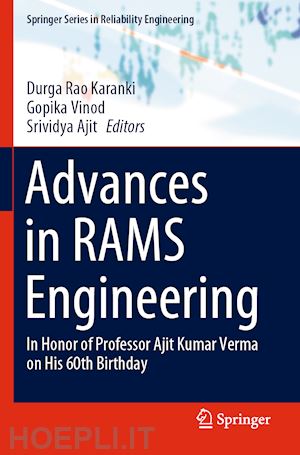
Questo prodotto usufruisce delle SPEDIZIONI GRATIS
selezionando l'opzione Corriere Veloce in fase di ordine.
Pagabile anche con Carta della cultura giovani e del merito, 18App Bonus Cultura e Carta del Docente
This book surveys reliability, availability, maintainability and safety (RAMS) analyses of various engineering systems. It highlights their role throughout the lifecycle of engineering systems and explains how RAMS activities contribute to their efficient and economic design and operation.
The book discusses a variety of examples and applications of RAMS analysis, including:
• software products;
• electrical and electronic engineering systems;
• mechanical engineering systems;
• nuclear power plants;
• chemical and process plants and
• railway systems.
The wide-ranging nature of the applications discussed highlights the multidisciplinary nature of complex engineering systems. The book provides a quick reference to the latest advances and terminology in various engineering fields, assisting students and researchers in the areas of reliability, availability, maintainability, and safety engineering.
Prognostic of Electronic Systems.- Challenges in Implementation.- Reliability Prediction of Instrumentation and Control Cables for NPP Applications.- BOCR Modelling for Decision Assessment.- A Multi-criteria Evaluation Framework.- DevOps for IT Service Reliability and Availability.- The Unpopularity of the Software Tester Role Among Software Practitioners: A Cuban Study.- Demand Forecasting in situations of Volatile Sales of Products.- A Study on Reliability of Rotors using XLrotor.- Time Variant Reliability Analysis of Passive Systems.- Passive System Reliability Assessment and its Integration into PSA.- Reliability Considerations in Analysis of Tunnels in Squeezing Rock.- DC and AC Contingency Solvers Used in Composite Power System Adequacy Assessment.- Fuzzy Approach to Well-being Analysis for Composite Power Systems Reliability Studies.- Reliable Distribution Systems Planning with Voltage Control.- Estimation of Power Quality Parameters using Soft Computing Techniques.- Predictive Maintenance Tools and Technologies for Transportation: A Review.- Optimum Decisions for Design of Maintenance Systems for Large Engineering Plants in an Industry 4.0 Scenario.- Artificial intelligence in Maintenance Engineering.- Probabilistic Safety Assessment in Nuclear & Non-nuclear Facilities: In a Glimpse.- Project Stage Considerations for an Inherently Safe and Reliable Chemical Plant.- Integrated Deterministic and Probabilistic Safety Assessment.- Fuzzy Logic Based Analysis of Dissolved Decay Contents in Transformer Oil.- Reliability Analysis of Microgrid Systems Using Hybrid Approaches.
Dr. Durga Rao Karanki is currently working as a RAMS Manager at Siemens Mobility AG (Switzerland) since 2017. He is responsible for planning, coordination, and performing RAMS activities for development and execution of European Train Control System (ETCS) projects. Previously, he worked as a Scientist at Paul Scherrer Institute (PSI) from 2009 to 2017. His research at PSI primarily focused on dynamic safety assessment and uncertainty management. Prior to joining PSI, he worked as a Scientific Officer (2002- 2009) at Bhabha Atomic Research Centre (India), where he conducted research on dynamic fault tree analysis, uncertainty analysis, and risk informed decision making of nuclear power plants. He is also a visiting faculty at several technical institutes. He has actively been involved in Reliability and Safety Assessment research and development for the last 17 years. His work resulted in more than 70 publications including 4 books, 15 first author journal papers, and several conference papers, with more than 900 citations. He received two awards for research Excellency from Society for Reliability Engineering, Quality and Operations Management (SREQOM). He is on the editorial board of three international journals in the area of reliability and risk analysis. He holds B.Tech in Electrical and Electronics Engineering from the Nagarjuna University (India), M.Tech in Reliability Engineering from the Indian Institute of Technology (IIT) Kharagpur and Ph.D. from the IIT Bombay.
Dr. Gopika Vinod received her doctoral degree in Reliability Engineering from Indian Institute of Technology, Bombay. She was the recipient of DAE Young Engineer Award 2007. She has been to visiting scientist at Brookhaven National Laboratory. Currently, she is heading the Probabilistic Safety Section of Reactor Safety Division of BARC. She also holds the position of Faculty with Homi Bhabha National Institute. She has been actively involved in Reliability, Safety and Risk analysis of Indian Nuclear Power Plants, nuclear and chemical facilities. She is in the editorial board of the International Journal of System Assurance Engineering and Management and the Journal of Life Cycle Reliability and Safety Engineering.Prof. A. Srividya has been a Guest Professor at Lulea Technical University, Sweden since Aug 2016 and was an Adjunct Professor of Maritime Studies at Western Norway University of Applied Sciences in autumn 2019. She has previously taught at the UiS Stavanger, Norway; at Stord/Haugesund University College, Norway; and at the IIT Bombay, India, where she was a Professor of Civil Engineering for over eight years with a research focus on Reliability and Safety Engineering & Quality Management.
She has executed various research projects to promote industrial collaboration and has been course coordinator for industry CEPs like Reliability Engineering, Quality Management, and Six Sigma forIT.
She has jointly edited books on Reliability Engineering, Quality Management and IT, and has co-authored five books on e.g. Fuzzy Reliability Engineering Concepts and Applications, Reliability and Safety Engineering, Dependability of Networked Computer Based Systems, and Risk Management for Non-Renewable Energy Systems.
Prof. Srividya has over two hundred publications in various national/international journals and conference proceedings to her credit. She is an Editor of the International Journal of Systems Assurance Engineering and Management (IJSAEM), published by Springer, and serves on the editorial board of the journal Communications in DQM.











Il sito utilizza cookie ed altri strumenti di tracciamento che raccolgono informazioni dal dispositivo dell’utente. Oltre ai cookie tecnici ed analitici aggregati, strettamente necessari per il funzionamento di questo sito web, previo consenso dell’utente possono essere installati cookie di profilazione e marketing e cookie dei social media. Cliccando su “Accetto tutti i cookie” saranno attivate tutte le categorie di cookie. Per accettare solo deterninate categorie di cookie, cliccare invece su “Impostazioni cookie”. Chiudendo il banner o continuando a navigare saranno installati solo cookie tecnici. Per maggiori dettagli, consultare la Cookie Policy.